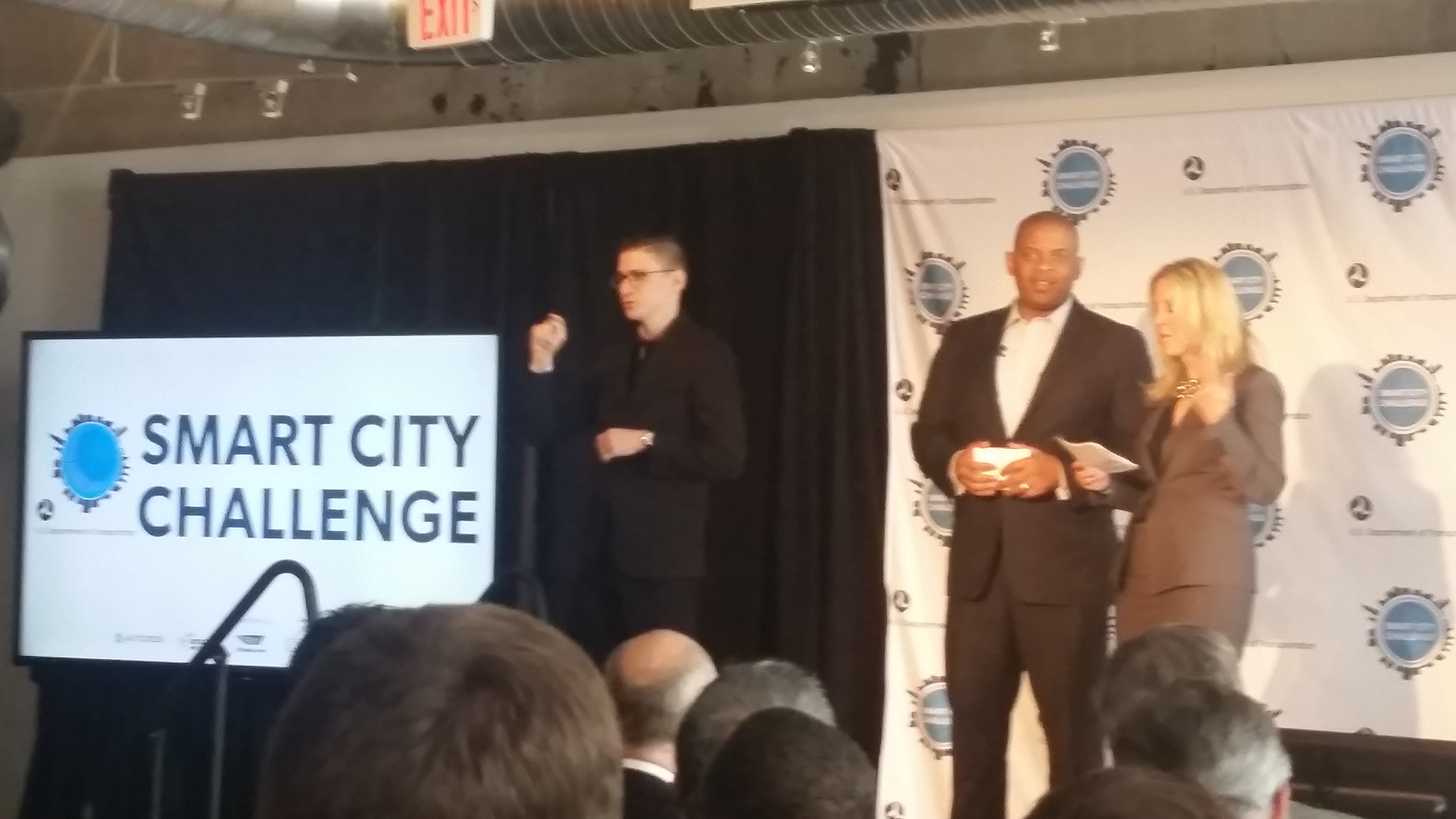Connecting state and local government leaders
“It’s really started a wave of innovative thought in transportation,” Transportation Secretary Anthony Foxx said of the grant competition.
WASHINGTON—Mayors from the seven finalist cities in a federal grant competition, which could provide access to as much as $50 million for next-generation transportation initiatives, made their final pitches to officials here Thursday.
Using transportation technology to address issues tied to social equity, and preparing American cities for advancements with self-driving vehicles and sensors that will allow for the collection of vast amounts of data, were among the overarching ideas in the presentations by the mayors.
The U.S. Department of Transportation launched the grant competition, known as the Smart City Challenge, last year.
The seven finalist cities are Austin, Texas; Columbus, Ohio; Denver; Kansas City, Missouri; Pittsburgh; Portland, Oregon; and San Francisco.
U.S. Transportation Secretary Anthony Foxx was among those on hand at Thursday’s event.
Pointing to emerging transportation technology, Foxx said: “Now is the time to start figuring out how it actually works. How we actually can apply it to solve problems for real people.”

Initially, 78 cities applied to the Smart City Challenge. USDOT winnowed those applicants to the seven finalists. The program will grant up to $40 million of federal funds—contingent on appropriations. The winning city will also become eligible for as much as $10 million from Seattle-based Vulcan Inc., a firm started by Microsoft co-founder Paul G. Allen.
The single city selected as the competition’s winner would act as a testing ground for technologies meant to help urban transportation and infrastructure systems operate more reliably, efficiently and safely.
Route Fifty profiled each of the cities Smart City Challenge finalists during the last two weeks.
Included in the finalist cities’ applications are plans for projects like self-driving shuttle buses, traffic signals that use machine learning to time signals so vehicle flows are improved, and sensors that detect road conditions in real time.
The USDOT is expected to choose a winning city this month.
Foxx told Route Fifty after the presentations on Thursday that one valuable aspect of the competition was that it pushed cities to examine the future of their transportation systems.
This is especially important, he said, at a time when, until late last year, a long-term surface transportation funding bill remained elusive in Congress—creating uncertainty for state and local governments looking to plan infrastructure projects. “What happens is, at the local level, people stop planning,” Foxx said. “They’re just trying to keep water from piling up in the boat.”
The Smart City Challenge, he added, also spurred cities to consider “whether the conventional forms of planning are going to work for the 21st century.
“It has really started a wave of innovative thought in transportation,” Foxx said.
Thursday’s pitches took place at a gallery space near the Walter E. Washington Convention Center, before a crowd of about 200 people. At least another 2,000 online viewers watched a livestream video of the event, which was hosted by Government Executive Media Group's Route Fifty.

Each mayor spoke on a stage for about 10 minutes describing their city’s plans. Their presentations also included slickly produced videos.
During a reception after the pitches, Portland Mayor Charlie Hales applauded the Smart City program, and suggested that all the proposals put forward by the finalist cities deserved funding.
“They ought to keep this momentum going,” he said, referring to the federal government.
Addressing economic divides, and ensuring that low income and minority communities are not left behind as new developments with transportation technology take root has been a key theme throughout the competition. “This isn't about technology. It's not about streets. It's about people,” Kansas City Mayor Sly James said during his pitch.
Foxx noted that the challenge differs from past transportation planning processes.
“One of the changes in approach that this challenge introduces is thinking about inclusion at the front end,” he said after the presentations. “Thinking about that before you create these divisions.”
Partnerships across government entities, with nonprofits and with the private sector have also proven to be an important element in the competition. For instance, Columbus Mayor Andrew Ginther noted that his city managed to corral an additional $90 million of funding commitments that would come on top of the $50 million available through the Smart City Challenge.
San Francisco Mayor Ed Lee said Thursday was the first time he’d heard descriptions of the other six proposals. “My emotion was God bless America,” he said. Not just because of the technology, but also because of the idea “we get to use transportation to be a great equalizer, as opposed to a barrier,” he said. “It reconfirms what values that we have as American cities.”
Bill Lucia is a Reporter at Government Executive's Route Fifty.

NEXT STORY: Denver Positions Its Role as a Hub City for Smart City Challenge Bid




